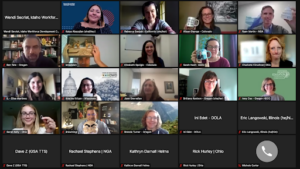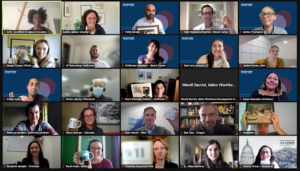Data is a Tool to Serve People: Takeaways from the Data Labs Kick-Off
October 22, 2021–By Sam Levy
Ask a room of public servants why they’ve chosen a career of service, and you’re likely to find a unifying thread in their responses: it’s about people.
From first-hand accounts of people who relied on government services during times of need, to parents who want to make a better future for their children, a cohort of government data and policy experts from eight states—California, Colorado, Idaho, Illinois, Ohio, Oregon, Utah, and Wisconsin—shared their public service stories during the kick off event for Data Labs: Roadmap to Recovery in September.
The eight-month-long program, created by the Beeck Center’s State Chief Data Officers Network and the National Governors Association, will help states leverage data-informed decision making to support people who have been significantly impacted by the economic consequences of COVID-19.
“The people’ is why we’re doing what we do, and data is the tool to help us better serve people,” one participant said during the event.
Through the program, Data Labs participants will thoughtfully design a data-informed project and build a customized action plan that gets key stakeholders on board for implementation. This unique program will be tailored to each state’s specific needs, allow for peer-to-peer learning, and amplify best practices and tactical examples of how other states have addressed similar challenges.


Former Maryland Governor Martin O’Malley joined the Data Labs kick-off to discuss the role of leadership in facilitating, supporting, and promoting data-driven decision making.
To benefit from the potential of data and technology, he said, we need to shift the practice of leadership. A “command and conquer” approach with authority at the top will not be sustainable in an information age. Now that everyone has access to information, governors and other leaders need to more closely collaborate with project teams to build a shared understanding on effectively tackling policy challenges through data-informed decision-making, O’Malley remarked.
The governor reiterated the importance of starting small, working iteratively, and celebrating wins along the way.
“Iterative, collaborative work has to start somewhere,” he noted, “but it keeps getting better.”

Also joining the event was Dave Zvenyach, the director of Technology Transformation Services at the U.S. General Services Administration, who shared his five-step approach for tackling data projects and reinforced a simple truth about data:
“Even if data is about people, it is not about the whole person. No data will capture the complexity of people and humanity.”
Kim Paull, director of data and analytics at the Health and Human Services Department in Rhode Island, and Josh Martin, chief data officer and executive director of the Indiana Performance Management Hub, shared their data management insights in conversation with Beeck Center Fellow Katya Abazajian.
Four pieces of wisdom emerged from the discussion:
- 1. One of the least helpful questions you can ask is, “how can I help you?” Don’t ask people what they want, watch what they do–then you’ll know what they truly need.
- 2. Start small, show results, and scale. Find the right size project that will have an impact and save people money!
- 3. You don’t make friends swinging a sledgehammer around. The risk of getting it wrong is scary, so you need to build trust, and continually maintain these relationships.
- 4. This work is hard. But why is it worth it? Because you can save lives.
Participants walked away from the launch event reminded of the importance and significance of the work at hand, and why we’re all here. It’s about people. We are excited to work shoulder-to-shoulder with states as we learn and grow together. If the convening was any indication of what’s to come, we have much to look forward to.
Sam Levy is a Program Manager leading the Data Labs Workforce Development cohort. Sam is passionate about creating a more equitable world through the use of data and technology.